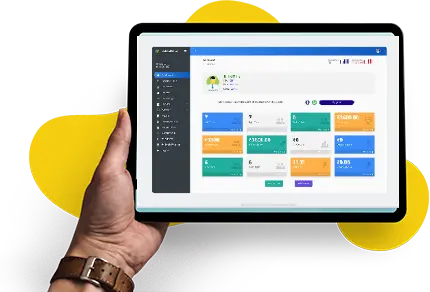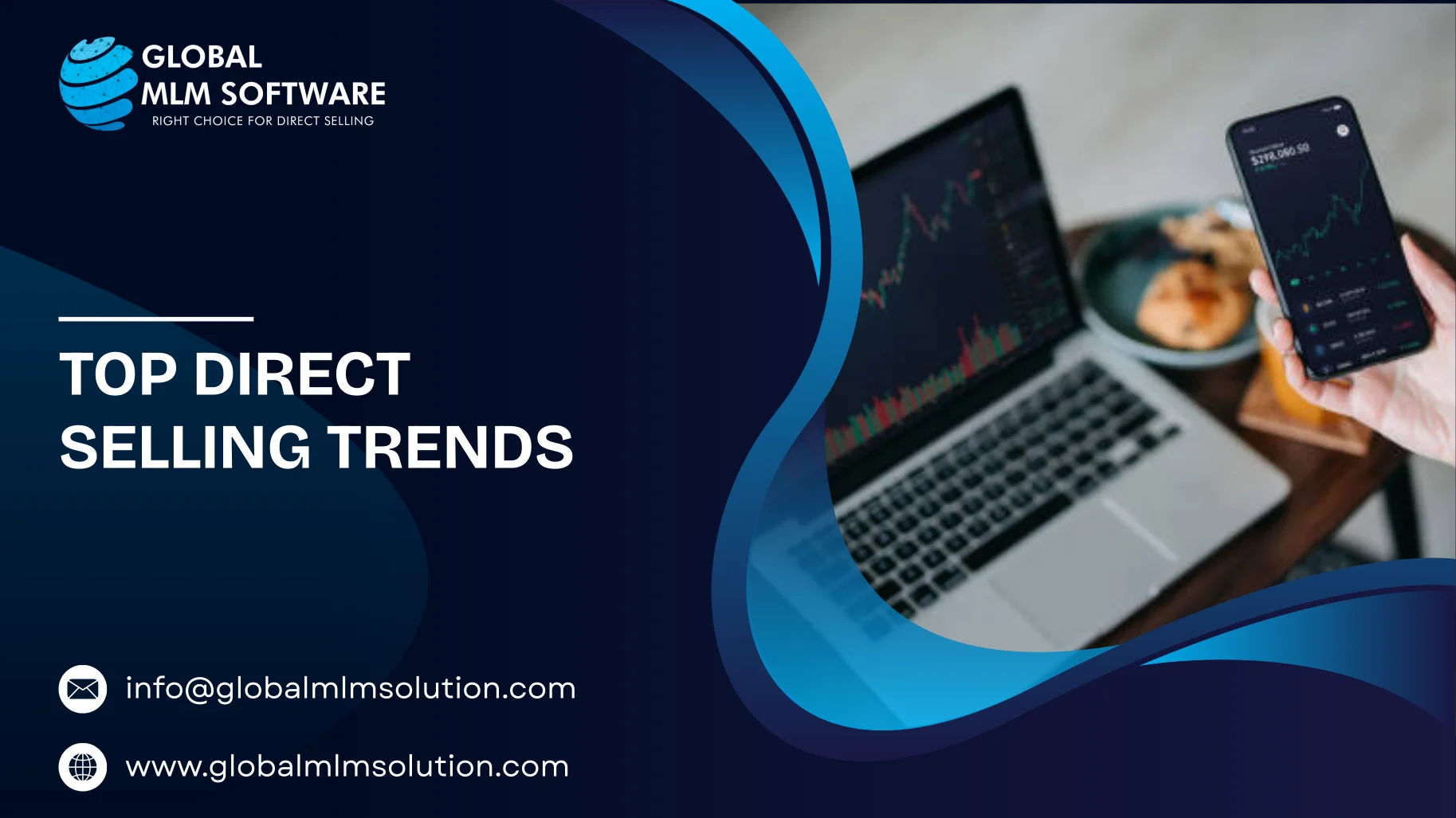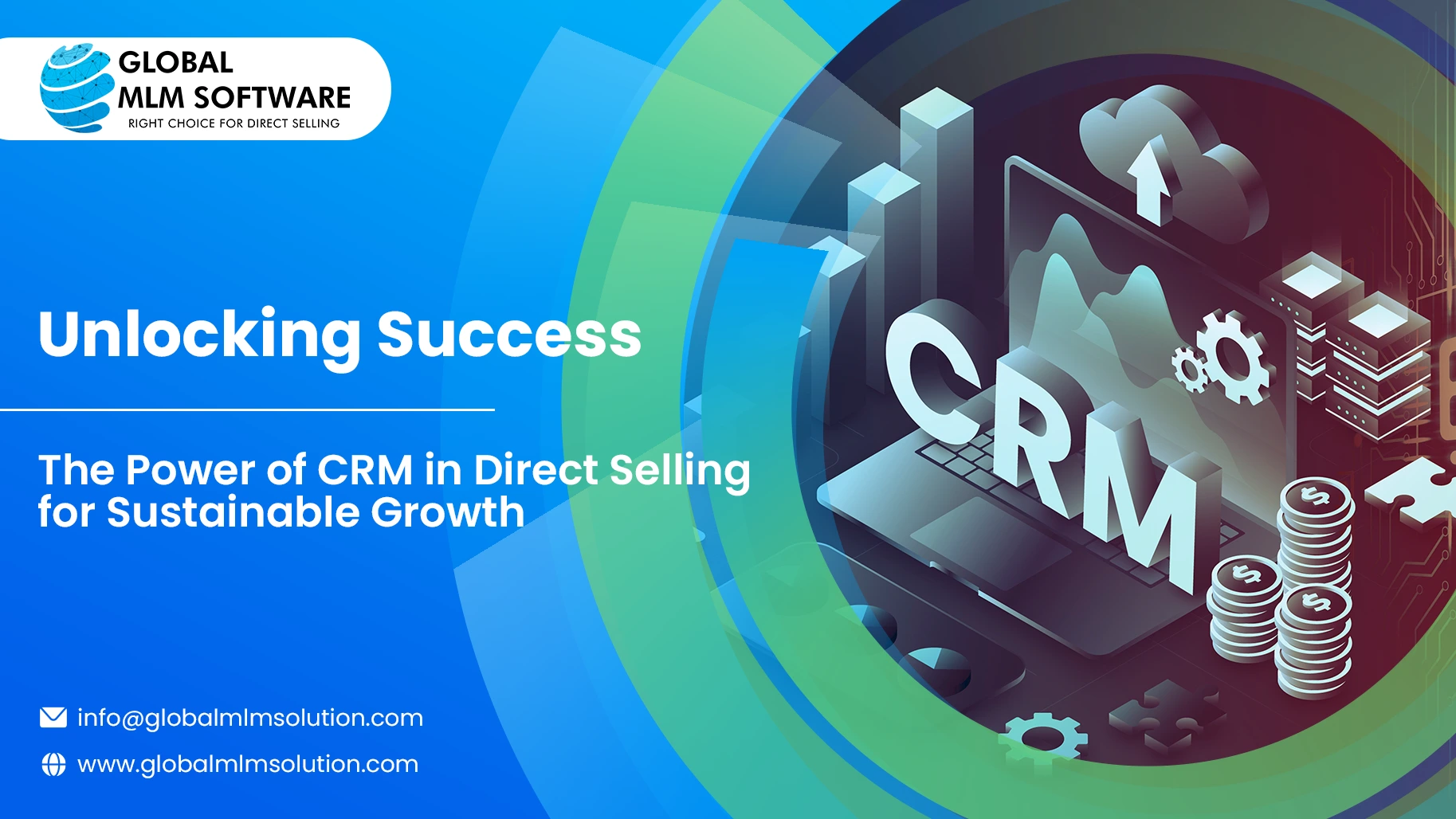For any industry, it’s important to keep up with the trends to have a leading position in the industry.
There is a huge shift in how MLM businesses operate today. Tech is improving as you read this article, compliance is becoming more effective, and communication is getting easier and impressionable.
Things like Social selling, AI, and even blockchain technology have become the norm. If you want to stay ahead of the curve, you need to go with the tide and adapt to the new.
In this article, we’ll explore the Top MLM industry trends of 2026. Not just that. You’ll also get real-world insights into how successful MLM companies are already implementing these trends, and how you can apply the same strategies to future-proof your own business.
This Article Contains:
Top MLM Trends You Can’t Afford to Ignore in 2026
Here, we’ve listed the top 9 MLM industry trends that can impact your MLM Business.
1. MLM Software for Improved Operations
Recent studies show that businesses that implement business management software report a 20% boost in productivity and a 15% reduction in operational costs within the first two years.
On top of that, 70% of users mentioned that they have made better business decisions with the assistance of real-time reports and analytics provided by management tools.
MLM Software is a necessity to run your MLM business smoothly. It helps you in tasks that’d be tougher to do manually:
Helping you visualize your business’s user tree; participants and their downlines.
Track the sales, commissions, and payouts
Automated rank advancement as per your compensation plan
Change in commission percentage and additional rewards as required
Reports to make data-driven decisions
One such efficient MLM Software is our Global MLM Software that helps MLM businesses to work efficiently, accurately, and compliantly.
The MLM software comes with a custom distributor compensation plan and was integrated with an e-commerce storefront. Global MLM Software also made the entire backend smooth and scalable, with multiple 3rd-party integrations, making it easier for payments, order processing, etc.
If you're serious about growing your MLM business, investing in the right software is a smart choice.
2. AI-Powered Personalization and Automation
Artificial Intelligence in MLM is becoming a powerful tool for businesses. It helps you work smarter by providing real-time insights, automating routine tasks, and making every customer interaction more personal and effective.
But AI isn’t just restricted to these areas. It’s taking over other processes too, like:
Understanding Customer Behavior: AI can analyze buying patterns and preferences to predict what your customers want next.
Tailored Marketing Approaches: AI helps segment your audience so you can send tailored messages and offers that actually lead to sales.
Lead scoring: AI scores your leads and helps you identify the most promising ones.
24/7 Chatbots and Virtual Assistants: Chatbots and virtual assistants can handle customer questions and onboard new distributors.
Real-Time Performance Tracking: AI will help you see how your distributors are performing and also provide you with smart tips to help them grow.
Automated Backend Operations: AI helps you automate manual tasks like commission calculations, order processing, and data entry.
Predictive Analysis: Get ahead of your competition with the help of AI-powered predictive analytics, which will help you forecast sales or spot trends before they hit.
Take Herbalife, for example. The brand started using AI tools like Salesforce Einstein. This AI tool gave their distributors real-time info on what customers wanted. It helped them have more meaningful conversations with their customers and close more sales.
Herbalife’s AI system was also integrated with various communication tools into one cloud-based system. This made it easier for teams to work together and serve customers better.
The result was higher distributor productivity, more engaged customers, and steady business growth.
So, how can you implement this MLM trend in your business? Try an AI-powered CRM, use marketing tools that personalize messages, and add a chatbot to make your business more available to your customers.
It doesn’t have to be complicated, but it can make a big difference in growing your business.
3. Social Selling
Social Selling means using various social media platforms to build genuine connections and sell products more naturally. It’s the easiest and fastest way to connect with customers and build a more trustworthy brand without being pushy.
A recent study shows that 82% of consumers use social media for product discovery. But they’re not just browsing for products, they're also paying attention to real user reviews, behind-the-scenes content, and whether your brand feels authentic and relatable.
When your distributors share their daily routines, product results, and behind-the-scenes glimpses of their lives, they’re building authentic connections with their audience.
This kind of user-generated content (UGC) leads to better trust, which often turns into more sales.
Oriflame is a great example of this. When they launched their NovAge Men’s skincare range in one of their markets, they tapped into social selling through user-generated content (UGC) rather than ad campaigns.
They encouraged women to introduce the products to the men in their lives. The campaign was all over the company’s social media platforms. Oriflame consultants shared beauty tips, personal posts, and authentic stories across social media platforms.
The campaign felt authentic, human, and engaging. It worked. The product saw high engagement across channels and quickly became the top-selling item in the NovAge line.
So, what do you learn from this? Social selling using UGC works far better to build trust than any polished ad campaign.
Encourage your team to sell through storytelling. Have them share how they use the product, what results they’re getting, and how it fits into their daily life. The more relatable the content, the more trust they build.
4. Mobile First Approach
These days, everyone uses their phone for everything, including shopping, chatting, checking social media, and even running a business.
In fact, according to Exploding Topics, 63% of web traffic in 2026 will come from mobile devices, and 96.3% of internet users are browsing the web from their phones.
This means that the majority of your audience will be interacting with your MLM brand on their phones. So, your websites, apps, and digital tools should all be easy to use on a phone.
Nu Skin is a great example of how powerful this MLM trend can be. They understood early on that they needed to make their brand more mobile-friendly and launched two amazing apps.
Nu Skin Vera uses face-scanning tech to give skincare advice. This is a perfect way to keep customers engaged with a tailored solution that solves their everyday skincare queries.
Nu Skin Stella is for their distributors. It's an all-in-one app that helps them find new customers, track their sales, and chat with people, basically everything they need to run their business, anytime, anywhere.
Because of these tools, Nu Skin's team became more productive, and their customers stayed engaged.
If you want to follow their lead, start by making sure your MLM website runs flawlessly on mobile. This means you need to check if your site loads faster on mobile devices, is easy to navigate, and has a mobile-friendly UI.
5. Global Expansion with a Local Touch
Nowadays, MLM businesses are not confined to one location. They are expanding. They are reaching out to markets that have potential. Now is the time to make your place in Southeast Asian, African, and Latin American countries.
Europe, America, and Western countries are already facing tough competition, where several MLM businesses are trying to keep hold of their existing distribution network customers.
These new markets give a way for MLM businesses to connect with people looking for flexible income opportunities and who have a passion for sales.
However, when you enter a new market, it’s not about selling products and services to a new location. It’s about providing what the local population needs.
Understanding cultural nuances, customer preferences, and distributor expectations that are unique to each region is an essential step to succeed.
Let’s take the example of the Amway MLM company.
Amway is one of the most widely used brands across the world. Though the company started its business in the US in 1959, it later expanded to Europe and the Pacific countries. However, it found its largest and most successful market much later, which is China.
Out of the entire global sales, 46.2% of Amway’s sales come from China.
How, the question is, how did Amway achieve it? Well, one thing is for sure. China’s market is much larger than Western countries combined. And Amway was one of the first MLM companies to start its business in China.
But that’s not the only reason why they achieved success. They picked up the global with local touch trend much earlier and offered products and established conduct accordingly.
Their health and wellness products work perfectly with the Chinese community.
They tailored their digital and offline presence that align with the local community's gestures, habits, and lifestyle.
They built trust through local community engagement.
They also invested in training centers and mobile commerce platforms to empower their distributors and stay competitive in China’s fast-moving digital space.
This localized approach increased their sales and also helped them build long-term relationships with both distributors and customers in one of the world’s most competitive markets.
If you're thinking about expanding your MLM business, this is your sign to look beyond your home base. Start researching markets where direct selling is on the rise. Tailor your product offerings to local preferences, translate your materials into regional languages, and build local leadership teams.
You don’t need a huge budget, just the right strategy, cultural understanding, and a willingness to adapt. The growth potential is huge if you are willing to explore.
6. Subscription-based MLM Model
People not only subscribe to applications and services, but it’s popular to subscribe to products as well.
If your MLM business is not following a subscription model, you are losing a lot of customers and sales for no reason.
When a customer subscribes to a product, they automatically receive it at the time when the previous package is going to end. So, it helps them maintain the continuity.
In case there’s no subscription option, they’ll have to order it every time, and they may miss out on ordering it, breaking the customer lifecycle. They may also look for other options when your product is not readily available. Therefore, subscription is essential for long-term retention.
It also saves your business from sending reminders, taking follow-ups, and unnecessary communication.
Besides that, it helps MLM businesses have a continuous income flow, better inventory management, and improved operational efficiency.
It provides you with better insights into product performance and customer engagement. For instance, if a product is not performing well and the churn rate is high, you can look into customers’ feedback and improve accordingly.
According to research conducted by Deloitte, the subscription e-commerce market has grown by more than 100% every year for the past five years.
Similarly, McKinsey also concluded that companies using a subscription model can see customer lifetime value jump 2 to 5 times higher than those that don’t.
One MLM company that got this MLM trend right is Scentsy. The company’s Whiff Box is a monthly subscription box that contains new, trending, and seasonal products. So, once someone purchases it, they are added as subscribers, and they automatically get it as per their subscription cycle.
To run an efficient subscription-based model, take care of these pointers:
Allow customers to select multiple products in one go, so that they don’t need to subscribe to each product separately. You can also run combo options for that.
Give them different quantity options and multiple subscription periods to choose from.
Keep the process of unsubscribing simple so that it doesn’t cause a frustrating experience and damage the reputation, even if the customer wants to move out of the subscription cycle.
Take feedback irrespective of whether the customer is continuing with the subscription or leaving it. It will provide you with the insights to be better.
7. Virtual Events and Webinars
One of the most popular MLM plans was Party MLM Plan, where distributors used to host parties, and prospects were the guests.
This trend supported making real-life connections and building trust between the company and prospects. However, hosting parties comes with a cost, and not everyone can make it to the party as it consumes time.
The tech brought a solution to this. Now, MLM parties are still hosted, but online. These virtual events are conducted by distributors, where they can show product demos, explain the ingredients, and take orders.
Virtual events give the benefit of connecting with the maximum number of people at once.
Besides that, even MLM companies can use virtual events and webinars to improve presence and efficiency, while minimizing the cost:
Do online onboarding of every distributor, and explain to them the products.
Conduct thorough training sessions without the need of requiring any offline meetings.
Conduct product launches, appreciation ceremonies, and conferences online.
One MLM company that makes the most out of this MLM trend is Plexus Worldwide. They’ve moved most of their events online, including their annual Plexus Virtual Convention.
Thousands of people tuned in from around the world to hear live keynotes, see new product launches, and join interactive breakout sessions, all from their own homes. They also run regular webinars to onboard recruits and keep their community strong.
If you want to implement this trend in your MLM business, start at the ground level.
You can request your distributors to conduct team meetings with the downline and presentations with prospects online. Discuss with them how it is working, where there’s room for improvement, and solve their issues.
Then, you can also conduct multiple local events, host webinars, and connect with distributors. When it works fine, take it to the next level and organize online product launches and annual events as well.
It not only saves your funds but also allows people to connect easily and regularly, leading to a stronger network.
8. Compliance and Ethical Selling
Honestly, more than an MLM industry trend, it’s a requirement now that you and your distributors need to follow.
Though Compliance has always been around, it’s more stringent in recent years. And that’s for the right reason.
Organizations like the Federal Trade Commission (FTC) and the Direct Selling Association (DSA) are keeping a close eye on things, from income claims to how products are marketed.
They are also watching how MLM companies operate to ensure there are no “unfair or deceptive means used.”
It includes:
How the compensation plan is structured.
Whether the earning claims align with the ground reality.
Whether they focus on sales or only recruitment.
Is there a refund or buyback policy, or not?
There are several such factors that you need to fulfill to ensure compliance.
To see how this shift toward stronger compliance is being put into action, look at Arbonne.
They’ve made ethics a central part of their business through their B.E.S.T. program: Business Ethics and Sustainability Team.
The program helps distributors stay compliant by training them on what to commit, how to communicate, and why to ensure correct earning claims.
9. Blockchain and Transparency
Blockchain technology revolutionizes the MLM industry by allowing customers to trace the origin of the products they use.
When the customers and distributors are facilitated by this feature, it builds trust and transparency, improving the MLM business’s reputation and standing as a truthful company.
That’s the reason why blockchain is one of the most popular MLM trends.
How does it exactly work?
It’s a digital ledger that records everything from sales, shipments, and payments. And once something is recorded in it, no one can change it. It’s secure, and everyone involved, including your company, your team, and your customers, has access to the same clear, trusted info.
So why does this matter for MLMs?
Traceability:You can track a product from the source to the customer’s hands. That means no guesswork when it comes to authenticity or ethical sourcing.
No room for fraud:Because data on the blockchain is permanent, it’s almost impossible to fake or manipulate anything.
Less admin stress:Smart contracts can automate things like payouts or order processing, so you save time and cut down on errors.
If you want to see blockchain implemented in real life, just take the example of Herbalife. The brand has used blockchain to track its entire supply chain, in order to boost transparency and help customers feel more confident about the products they’re using.
If you’re running an MLM and looking for a way to stand out, this is a smart step forward. Using blockchain shows your business is serious about trust, accountability, and doing things right.
It helps you run smoother, stay safer, and earn long-term loyalty from your team and your customers.
Conclusion
MLM trends may keep changing, but what really matters is how you use them to create a positive impact. Each trend that we have mentioned here points to a bigger shift: the MLM industry is becoming more transparent, empowering, and people-focused.
So while it's important to stay ahead of these MLM industry trends, you also need to focus on building an MLM business with a strong foundation of trust, ethics, and authenticity. That’s what will set you apart and help you grow a resilient, future-ready MLM business.
FAQs
1. Are younger generations getting involved in MLM?
Yes, younger generations, especially Gen Z, are showing interest in MLM thanks to flexible income options and social media tools. There is a growing MLM trend of designing digital-first platforms that appeal to their lifestyle and tech-savvy approach.
2. Are cryptocurrency and digital payments influencing MLM trends?
Absolutely. One of the newer MLM industry trends is the shift toward crypto payments and digital wallets. This is making global transactions faster and more secure for both companies and distributors.
3. How are MLM companies using data analytics today?
Data-driven decision-making is increasing among the MLM entrepreneurs. Companies are using analytics to better understand customer behavior, improve distributor performance, and personalize marketing strategies.
4. What’s the future of hybrid MLM models?
Hybrid models blending traditional direct sales with online affiliate-style marketing are becoming a leading MLM industry trend. They offer greater flexibility for part-time sellers and attract a broader audience.
5. Is virtual reality (VR) making its way into MLM training?
Yes, VR is emerging as a futuristic MLM trend. It is used for immersive MLM Training, virtual events, and global onboarding. It enhances engagement while cutting down on travel costs and logistics.
References
-
FTC.gov
-
Direct Selling Association
Disclaimer: Global MLM Software does not endorse any companies or products mentioned in this article. The content is derived from publicly available resources and does not favor any specific organizations, individuals or products.







